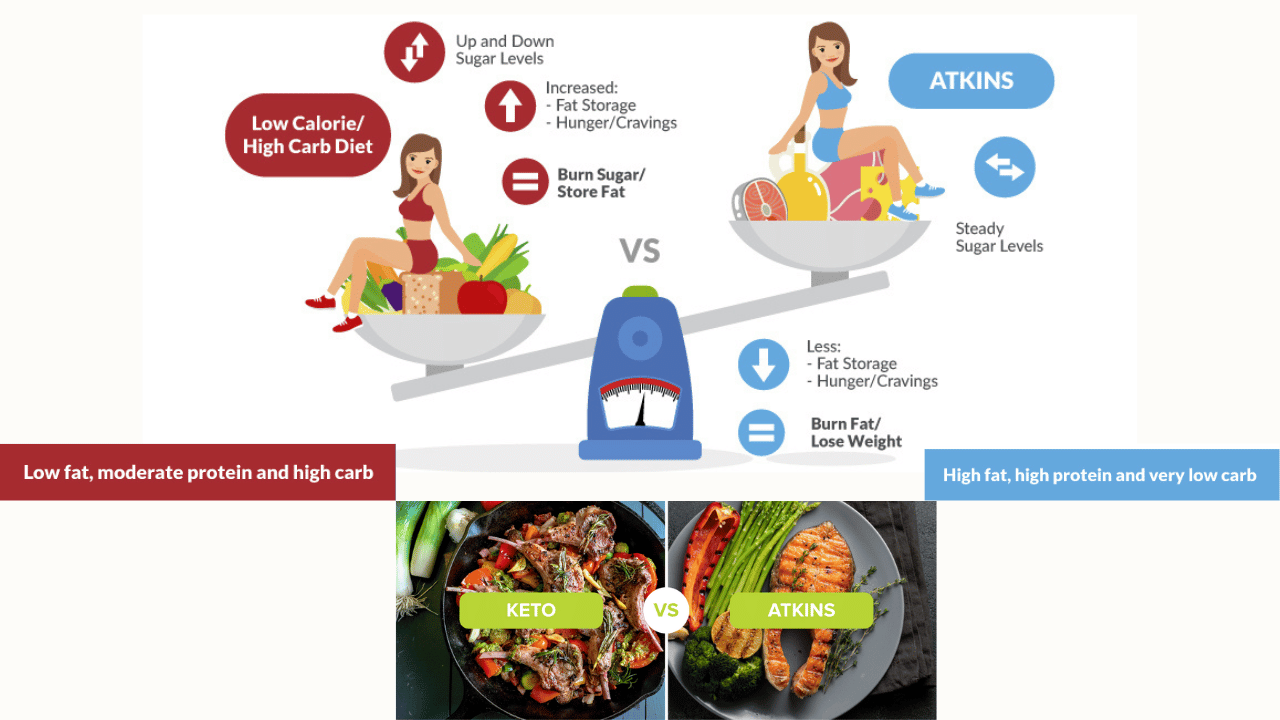How many carbs can I eat on a keto diet? Determining Net Carbohydrate Intake for a Keto Diet! The ketogenic, or keto, diet is a low-carbohydrate, high-fat dietary approach that has gained popularity for its potential to aid in weight loss and improve metabolic health.
A key component of the keto diet is the restriction of carbohydrate intake, but determining the exact amount of carbs one can consume can be a complex task.
In this article, we will explore how many net carbs a keto female can eat, the importance of distinguishing between net carbs and total carbs, and the implications of this distinction for weight loss and diabetes management.
Net Carbs vs. Total Carbs
To understand how many carbs can be consumed on a keto diet, it is essential to differentiate between net carbs and total carbs. Total carbs refer to the sum of all carbohydrates in a food item, including both simple sugars and dietary fiber.
On the other hand, net carbs represent the carbohydrates that have a direct impact on blood sugar levels. They are calculated by subtracting the dietary fiber and certain sugar alcohols from the total carbs. The reasoning behind this distinction is that dietary fiber and some sugar alcohols do not significantly raise blood sugar levels.
Keto Carb Calculator
Calculating net carbs requires attention to detail and accuracy. Many individuals turn to online keto carb calculators to simplify this process. These calculators typically require inputting the total carbs, dietary fiber, and sugar alcohols listed on a food label. The calculator then computes the net carb content, providing a clearer picture of the carbohydrates that will affect ketosis—the metabolic state where the body primarily burns fat for energy.
How Many Net Carbs for a Keto Female?
The daily net carb intake on a keto diet can vary based on individual factors, such as age, gender, activity level, and metabolic rate. However, a general guideline for most keto followers is to limit daily net carb intake to 20-50 grams. For keto females, this range can be particularly effective in achieving and maintaining ketosis while ensuring sufficient energy intake. It is crucial to note that some highly active individuals or those with specific health conditions may be able to consume slightly more net carbs while remaining in ketosis.
Net Carbs for Weight Loss
The restriction of net carbs on a keto diet plays a pivotal role in weight loss. When net carb intake is limited, the body’s primary source of energy shifts from carbohydrates to fats. As a result, the body enters a state of ketosis, where it burns stored fat for fuel, leading to weight loss. By focusing on net carbs rather than total carbs, individuals can make more informed food choices that support their weight loss goals.
Net Carbs for Diabetes Management
For individuals with diabetes, distinguishing between net carbs and total carbs is also crucial. Net carbs have a more direct impact on blood sugar levels than total carbs. By reducing net carb intake, individuals with diabetes can better control their blood sugar levels, potentially leading to improved glycemic control and reduced reliance on medication. It is essential for individuals with diabetes to consult with a healthcare professional or registered dietitian when implementing a keto diet to ensure it is safe and effective for their specific needs.
The Role of Net Carbs for Diabetics
Individuals with diabetes often find the management of carbohydrate intake a critical aspect of their daily routine. Net carbs play a significant role in this aspect as they provide a more accurate representation of carbohydrates’ effect on blood sugar levels. Total carbs encompass both simple and complex carbohydrates, including dietary fiber, which is not digested by the body and does not contribute to blood glucose levels. By focusing on net carbs, individuals with diabetes can tailor their carbohydrate intake to minimize spikes in blood sugar, thereby aiding in glycemic control. This approach may reduce the need for insulin or other diabetes medications, contributing to a more stabilized blood glucose profile.

Net Carbs for Weight Loss and Metabolic State
The concept of net carbs is pivotal in the success of a ketogenic diet, particularly regarding weight loss and the induction of ketosis. Ketosis is a metabolic state characterized by the increased production of ketones from fats, which become the body’s primary source of energy. Restricting net carbs effectively induces and sustains ketosis, promoting fat breakdown and weight loss. The practicality of tracking net carbs versus total carbs lies in the metabolic shift that occurs when net carb consumption is minimized. By accurately calculating net carbs, individuals can ensure they are maintaining the necessary carbohydrate restriction to sustain ketosis, ultimately aiding in their weight loss goals.
The Importance of Precision in Net Carb Calculation
Utilizing a net carb calculator is pivotal in achieving dietary precision on a keto diet. The accuracy of carbohydrate counting is crucial, as even a slight deviation in net carb calculation may impact ketosis and subsequently hinder weight loss or metabolic progress. Online net carb calculators provide an efficient tool for individuals to monitor their carbohydrate intake, ensuring they remain within the specified net carb range for the keto diet. The convenience and accessibility of these calculators contribute to the overall adherence and success of the ketogenic dietary approach.
Considerations and Future Directions
While the distinction between net carbs and total carbs is integral to the success of the keto diet, ongoing research and advancements in nutritional science may refine our understanding further. Future investigations may delve deeper into the individual variations in net carb tolerance and the influence of factors such as genetics, age, and physical activity level. Additionally, continued research could provide more precise guidelines for net carb intake tailored to specific health conditions, further enhancing the therapeutic potential of the keto diet.
The differentiation between net carbs and total carbs is pivotal in the context of the keto diet, influencing weight loss, metabolic states, and blood sugar management, particularly for individuals with diabetes. Utilizing accurate net carb calculations through reliable online tools like keto carb calculators empowers individuals to make informed dietary choices. This, in turn, supports their objectives of achieving and maintaining ketosis, effective weight management, and improved glycemic control. As understanding of nutritional science evolves, refining net carb recommendations and approaches will continue to enhance the overall efficacy and applicability of the ketogenic dietary approach for a diverse range of individuals.
Practical Application: Educating and Guiding Individuals
For healthcare professionals, dietitians, and nutritionists, imparting knowledge about net carbs and their significance in the context of the keto diet is crucial. Providing accurate information on how to calculate net carbs, interpret nutritional labels, and make informed dietary choices empowers individuals to adhere to the keto diet effectively. Moreover, emphasizing the importance of regular monitoring, both through self-awareness and, when necessary, digital tools, helps individuals remain within their targeted net carb range for optimal results.
Future Prospects: Emerging Research and Implications
Continued research in the realm of nutrition and dietary management is essential to refine our understanding of the keto diet and the significance of net carbs. As technology advances, there is potential for more sophisticated tools and methodologies to precisely calculate net carbs and tailor dietary recommendations. Additionally, ongoing studies exploring the long-term effects of sustained ketosis, especially in different demographics, will provide deeper insights into the safety and efficacy of the keto diet.
Moreover, investigations into the metabolic and physiological responses to varying net carb thresholds can elucidate optimal net carb ranges for different individuals, enhancing the customization of the keto diet. Understanding how net carbs influence factors like insulin sensitivity, satiety, and metabolic rate can further optimize dietary strategies and potentially broaden the applicability of the keto diet to a broader population.
Final Remarks
In the realm of dietary management, the distinction between net carbs and total carbs is a critical determinant of the success and effectiveness of the ketogenic diet. By accurately calculating and regulating net carb intake, individuals can harness the metabolic benefits of ketosis for weight loss and improved glycemic control, especially important for those managing diabetes. The advent of online tools, such as keto carb calculators, further streamlines this process, enabling individuals to monitor their net carb consumption with precision. Continued research and a balanced integration of online dialogue with scientific knowledge will undoubtedly enhance our understanding and application of net carbs in the context of the ketogenic dietary approach.
Acknowledging Limitations and Encouraging Informed Choices
While the keto diet’s focus on net carbs offers promising results, it’s important to acknowledge potential limitations. Individual responses to dietary approaches, including the keto diet, can vary based on numerous factors such as metabolism, body composition, and overall health status. Therefore, a one-size-fits-all approach to net carb consumption may not be optimal. Tailoring net carb limits to individual circumstances and regularly assessing progress is key to achieving desired outcomes while mitigating potential adverse effects.
Furthermore, individuals embarking on a keto diet should be encouraged to consume nutrient-dense foods that align with their macronutrient goals. Prioritizing high-quality fats, lean proteins, and fiber-rich vegetables can provide essential vitamins and minerals crucial for overall health. Consulting a healthcare professional or registered dietitian before making significant dietary changes is advisable to ensure a safe and balanced approach to a keto diet, especially for individuals with underlying health conditions.
In conclusion, understanding the nuanced difference between net carbs and total carbs is paramount for the successful implementation of the keto diet. Accurate calculation and management of net carbs provide a pathway to achieving and maintaining ketosis, facilitating weight loss, and aiding in diabetes management. Engaging in informed discussions, leveraging online platforms, and utilizing precise net carb calculation tools contribute to an enhanced understanding and practical application of net carbs in the context of the ketogenic dietary approach. Striking a balance between empirical knowledge, online dialogue, and individualized guidance from healthcare professionals ensures a comprehensive and personalized approach to a keto diet, optimizing its potential benefits while minimizing associated risks.











